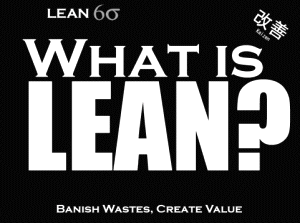|
What Is Lean Manufacturing?Rip Out The Cost And Up The Value!
What is lean manufacturing? A simple lean manufacturing definition is to say that lean is a term used to describe a number of inter-related methodologies that focus on the maximisation of value and the minimization of waste in the manufacturing processes. Lean is a philosophy – or mindset - where the focus is on: (1) VALUE - i.e. those aspects and attributes of the manufactured product that the customer IS prepared to pay for, and in lean terminology, these are seen as "value" (2) WASTE - i.e. those aspects and attributes of the manufactured product that the customer is NOT prepared to pay for, and in lean terminology, these are seen as "waste" In contrast to the "standard view" which sees the selling price of the product determined by cost plus profit, the "lean view" sees profit as a result of cost/waste cut out of the selling price.
Lean Manufacturing PrinciplesThe Lean Enterprise Institute, Inc. describes itself as a "do tank" rather than a "think tank". Their whole focus is on: "how can I make a difference to my organisation?" and their organisation provides managers support through events, on line resources and community to become effective lean change agents: The five-step thought process for guiding the implementation of lean techniques is easy to remember, but not always easy to achieve:
You can read more here: What is lean manufacturing - what are lean principles?
Lean Manufacturing Definition and Introduction
Lean Manufacturing Example - Toyota Plant Kentucky
Change Management and Lean Manufacturing - The People SideThe people-side of any form of organisational change is on the critical path to success: The simple fact of life is that every point of intersection between a changed business process and a human being has the potential for resistance - and thus failure - and this is mitigated by the recognition and implementation of some form of appropriate change management. I have written about this is the section on Six Sigma, you can find the full section here:
Resources on Lean ManufacturingSteps In Six Sigma Methodology
|





